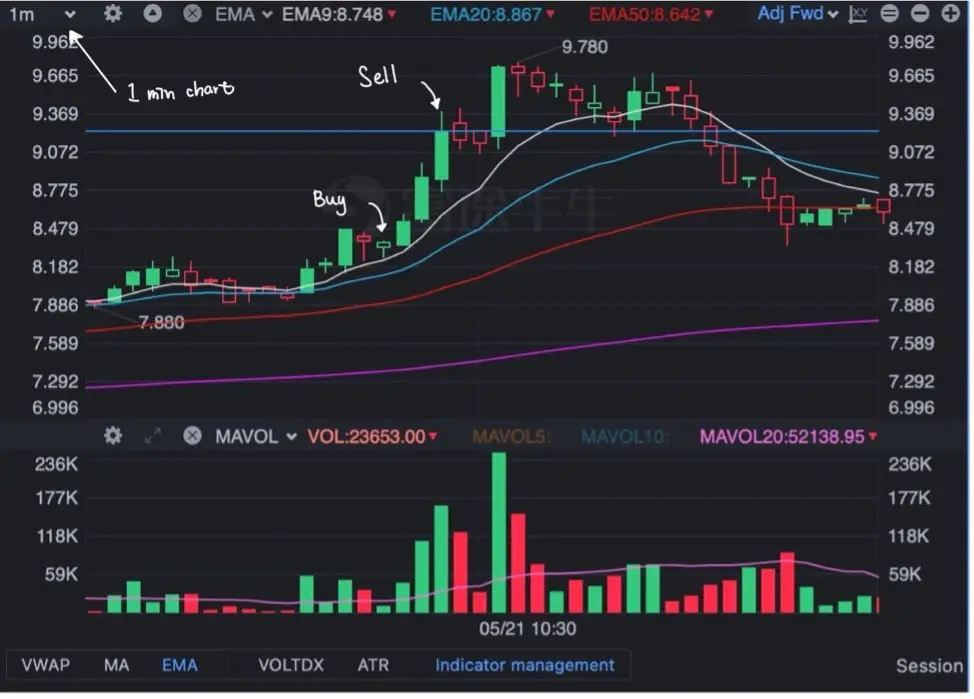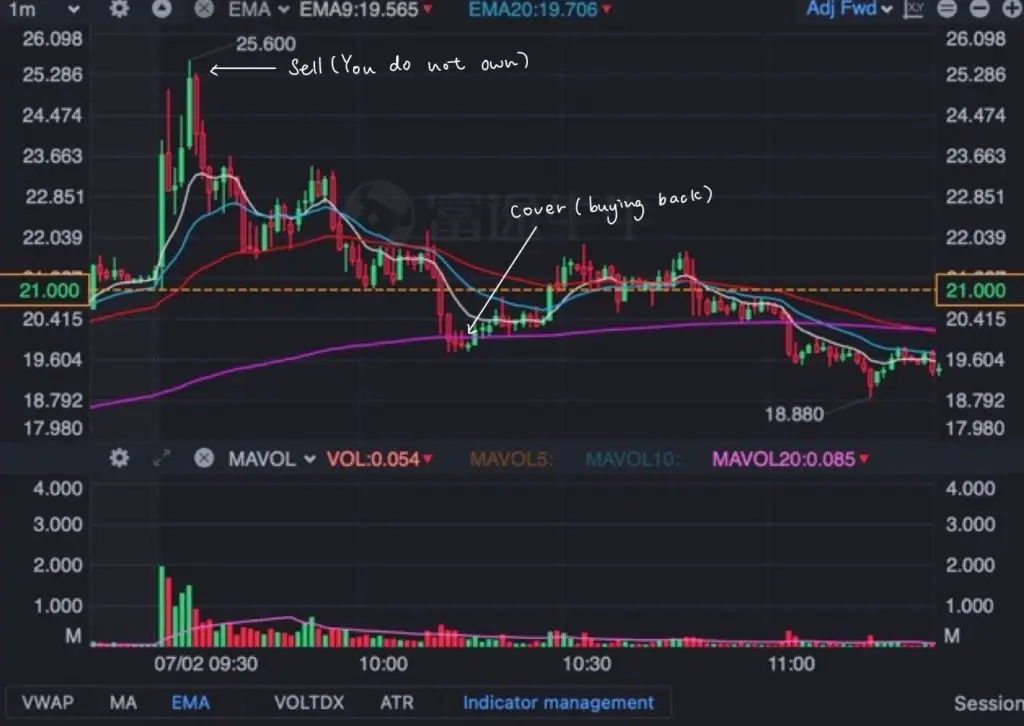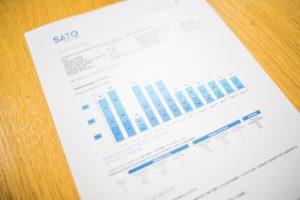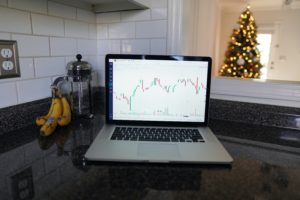(if you are following the order that I have arranged in the Trading Essentials page, you could neglect all the links of related articles in this page)
[This page contains affiliate links. This means that we may earn a commission if/when you click on or make purchases via affiliate links.]
Foreword
How do you trade stocks? Long buying? Short selling? It has been one of the biggest questions for newcomers to think about which trading strategy they should choose to trade stocks. In this article, I will compare them and tell you which you should choose to trade stocks. Hope you could find it helpful.
What is Long Buying?

Long buying is a practice that allows traders or investors to profit from rising prices. In other words, they buy low and sell high. Often, traders or investors would long buy a stock when they believe the price will rise. It is a strategy that traders and investors often use during a bull market.
Being a long buyer, you need to be good at finding and riding momentums in the market. There is always about 90% of traders doing long buying in the market despite the market condition.
What is Short Selling?

Short selling is a practice that allows traders or investors to profit from falling prices. In other words, they sell high and cover(buy) low, conceptually opposite to long buying. Often, traders or investors would short sell a stock when they believe the price will fall. It is a strategy that traders and investors commonly use during a bear market.
Being a short seller, you need to be good at predicting the psychological price limit of long buyers and create selling pressures. There is always about 10% of traders doing short selling in the market despite the market condition.
Requirement?
There is not any qualification needed for becoming a long buyer or short seller. However, you need to be aware of several things before you trade stocks.
1. Account type
No matter if you are a long buyer or a short seller, you are to open a brokerage account to trade stocks.
As a long buyer, you could either open a cash account or a margin account to buy stocks. Just a thing to keep in mind, you should be aware of the regulations or restrictions when you are using either a cash account or a margin account. Running afoul of these regulations or restrictions may get you into trouble. Be sure to check them out.
Things go a little bit different when short selling. You could only short sell securities with a margin account. The principle of short selling is to sell securities borrowed from your broker and return them later by covering the security at a lower price. And this could only be achieved by using a margin account. You should also be aware of those regulations or restrictions when you are opening your margin account.
Related article: How to choose your account type? & How to short stocks?
2. Techniques
The ways long buyers or short sellers analyze and trade stocks are almost the same. They both rely on technical and fundamental analysis to judge whether it is the timing or not to jump into the market. The only difference between them is the time they get into the market. Usually, longer buyers will get into the market when the stock price starts rising (or what we say, the start of uprising momentum), while short sellers will get into the market when the trend reverse.
(Extra: Finviz.com is the most common online free tool that traders use when analyzing stocks)
3. Tools
The tools long buyers or short sellers use when trading stocks are the same. They both use newsfeed tools, screening tools, and charting programs to find the stocks they would like to trade.
| Tools | Recommendations |
|---|---|
| Newsfeed | 1️⃣ Benzinga Pro 2️⃣ Bloomberg 3️⃣ MarketWatch 4️⃣ Yahoo Finance |
| Screening | 1️⃣ TradeIdeas 2️⃣ StockToTrade 3️⃣ Finviz |
| Charting | 1️⃣ E-signal 2️⃣ TC2000 ($25 coupon with this link now ‼️) |
Potential loss vs Potential Gain (Risk Reward Ratio)?
Talking about loss, your maximum potential loss from long buying trades is your initial investment. The potential loss becomes infinitely large when you short sell securities since there is no limit for a stock price to rise but a limit for the stock price to fall.

The potential loss of short selling could be tremendous when comparing to long buying. However, its potential gain could also be huge in some cases. Besides, profiting from short selling is way easier when comparing to long buying since a falling price is much easier to predict than a rising price.
| Trading Strategy | Maximum Loss | Potential Gain | Opportunities |
|---|---|---|---|
| Long | Initial Investment | Normal (Could be huge) | Fewer |
| Short | Infinity | Normal (Could be huge) | More |
Example

You may probably hear of the GameStop (GME) incident, happened in January 2021. The stock price of GME soared due to online discussions on Reddit.
Long
Imagine you were a long buyer of GME after the stock price soared. You bought 100 shares when the price was $483, and you held it until it tumbled to its lowest price, $44. How much you would you lost in that trade? (483-44) *100 = $43900.

Of course, if you did buy and sell the stocks at the right time, you could make a fortune. However, without experience and an entry and exit plan, traders seldom could maximize their profit or even profit from the trades. If you don’t know what I am talking about, you look at the below picture.

You will not profit from the move if you lack experience and an entry and exit plan. And that’s why we should be educated.
Short
Imagine you were a short seller of GME before the stock price soared. You shorted 100 shares when the price was still at $40, and you held it until it reached its highest price, $483. How much would you lose in that trade? Your loss would equal (483-40) *100 = $44300.

But what if the price goes even higher? Your potential loss would be tremendous in such a case. To avoid losing more than what you have, your broker will enforce you to cover your position when your loss is equal or larger than your account value.
Of course, if you did the short sell at the right time, you could make a fortune. However, without experience, robust self-discipline, and good risk management skills, traders seldom could find the right timing to enter and exit the market.
Which Should You Learn?
Both Long buying and short selling have their upsides and downsides.
| Trading strategy? | Maximum Loss? | Potential Gain? | Opportunities? | Troublesome? | Experience required? |
|---|---|---|---|---|---|
| Long | Initial Investment | Normal (Could be huge) | Fewer | No | Beginner - Professional |
| Short | Infinity | Normal (Could be huge) | More | Yes | Professional |
However, if you are a beginner, I suggest you stick with long buying first since the potential loss of short selling is way too much compared to long buying. You will destroy your account in a moment without experience in stock trading.
Besides, long buying is way easier in contrast with short selling. To do long buying, all you need to do is fund your account and place orders during market hours. Things get much more complicated when short selling. To do short selling, you need to check whether the stocks are available to short, locate them, borrow them, and more.
Apart from the procedure, various fees such as borrowing fees, locating fees, overnight fees would also be charged when short selling. If you are a beginner or don’t want to deal with troublesome stuff, it would be better for you to stick with long buying.
Related article: How to short stocks?
(Of course, you could also learn how to short stocks after you gain enough experience in long buying if you wish to short sell stocks rather than long buy stocks.)
Final Thought
In this article, I have compared both long buying and short selling in terms of things should be aware of when doing them, potential loss, and gain (risk-reward). They both have their upsides and downsides. Please make sure you know their difference since it will be essential when building your foundation in stock trading. Hope you will find this article helpful.
[Next Lesson: How to buy stocks in 6 steps]





